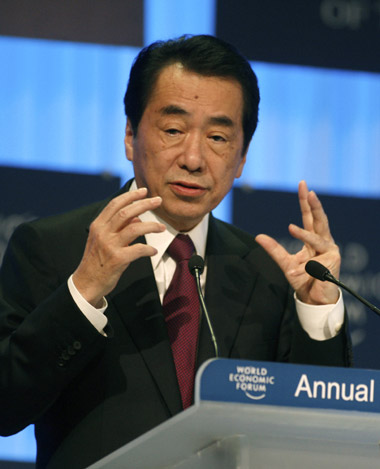Foreign and Military Affairs
Kan: China growth positive for Japan
By Cheng Guangjin (China Daily)
Updated: 2011-01-31 06:55
 |
Large Medium Small |
BEIJING - Japanese Prime Minister Naoto Kan's statement "welcoming" China overtaking his nation as the world's second-largest economy points to a positive and strong change in future China-Japan relations, according to analysts.
Kan made the comment at the World Economic Forum in Davos, Switzerland, which he visited on Saturday to address the VIP gathering.
 |
|
Japanese Prime Minister Naoto Kan says his nation's relationship with China is "extremely important". [China Daily] |
In his speech, Kan said "the world faces major changes that can be likened to a tectonic shift both in the national security and economic fields", and Asia is "the center of major tectonic changes".
Against this background, he said, the Japan-US alliance "is becoming even more important" and should continue to play a key role in the Asia-Pacific region.
"For Japan, its relationship with China, which is expanding its influence in Asia as it achieves remarkable economic growth, is extremely important," Kan added.
"Both Japan and China have an important responsibility to bear in the international community, and will need to enhance cooperation in a wide array of fields such as the economy, regional stability and the global environment," he said.
| ||||
"China's growth will have a positive impact on Japan, both economically and socially," said Kan.
He also said China should have "greater responsibilities internationally" with such a large economy, adding that he hoped that "China recognizes this important responsibility that it bears and acts accordingly".
Shen Shishun, an expert on Asia-Pacific studies with China Institute of International Studies, said what Kan said signaled a positive and strong change in future China-Japan relations as he "has realized China's development is not a threat to Japan, but brings it opportunities".
Kan also has to follow the US, its important ally, which experienced positive changes in relations with China after President Hu Jintao's visit earlier this month, Shen noted.
"Japan will not choose to isolate itself out of the framework that China and the US have established," Shen said. Sino-Japanese relations soured since the September collision between a Chinese fishing boat and two Japanese patrol boats in waters off China's Diaoyu Islands, which Japan also claims.
In the latest development, Japanese officials complained to a major US newspaper after it published a column saying that China's sovereignty over the Diaoyu Islands "has a strong historical case", Japan's Mainichi Daily News reported on Friday.
In the New York Times column published on Jan 20, op-ed columnist Nicholas Kristof said: "My take is that China has a strong historical case in claiming the ... islands" known as the Diaoyu Islands.
Japanese Foreign Ministry Press Secretary Satoru Sato claimed in a letter to the editor of the US newspaper, which was published on Thursday, that the islands are "clearly an inherent territory of Japan".
Shen said what the US columnist had done was just reminding people of a historical truth. "Japan should admit the fact and negotiate with China using hard evidence".
AP and Dow Jones Newswires contributed to this story.











